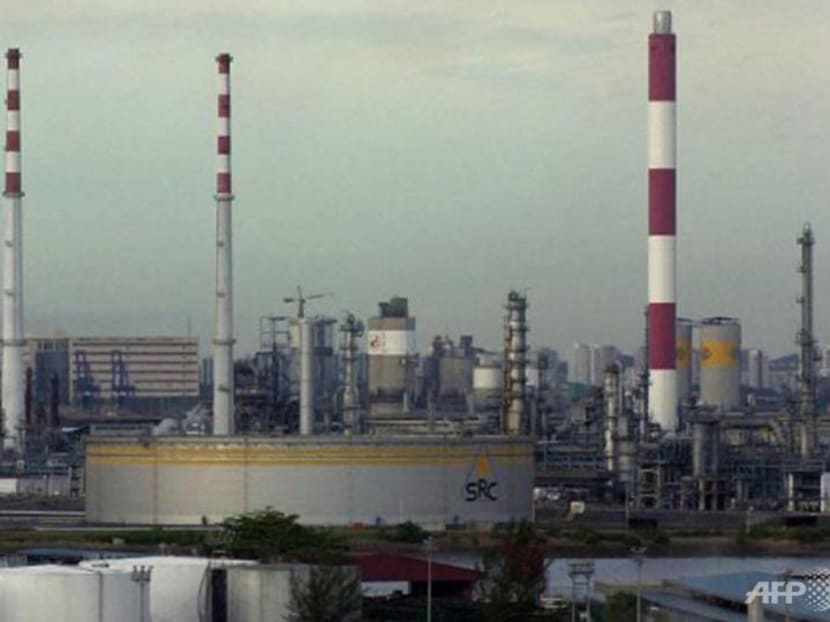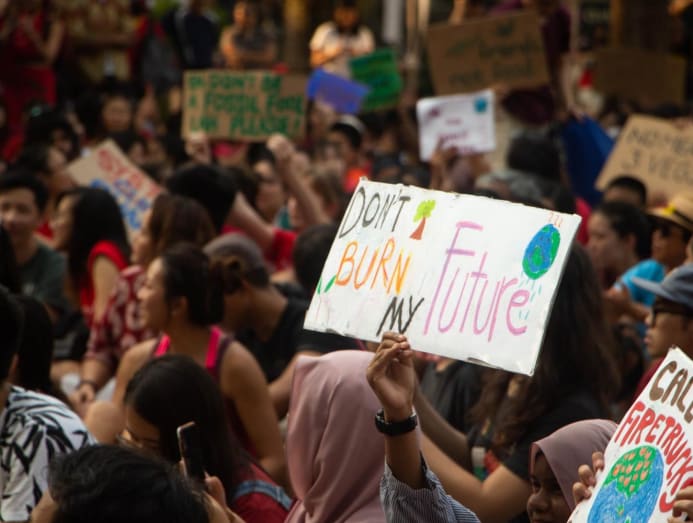Commentary: Bad news for Singapore’s oil and gas industry as young people shun fossil fuels?
Students have called out local universities’ engagement with the fossil fuel industry, which might be one more troubling development for the country's petrochemical industry, say energy researcher Melissa Low and environmental studies undergraduate Saw Sze Jie.

Chemical refineries in Singapore. (Photo: AFP)
SINGAPORE: Singapore is one of the world’s leading energy and chemical hubs, home to companies with major refining and petrochemical operations.
But young people find the fossil fuel industry unappealing, with many considering a career in clean energy a safer bet.
On Jan 17, Students For A Fossil Free Future (S4F) highlighted the links between Singapore universities and the fossil fuel industry in a 68-page report. The group called for an end to the fossil fuel industry’s influence on Singapore’s education system.
Although many oil and gas firms have announced plans to use the pandemic to rethink sustainability and have invested heavily in clean technologies, this generation perceives that fossil fuels are bad, informed by worldwide climate movements calling for the industry’s end.
To them, reduced consumption and clean energy should be favoured over fossil fuels if we are truly aiming for a net-zero future.
Moreover, the pandemic has brought about renewed emphasis on health and well-being, which could result in a slower flow of new talent into the oil and gas sector.
Are these troubling developments for Singapore’s petrochemical industry, long an engine for the country’s economic growth?

BEHIND THE CALLS FOR LOCAL UNIVERSITIES TO DIVEST
With Singaporean universities offering more courses in environmental sciences, nature-based solutions, green finance and more, local youth are better-equipped than ever to step up and speak out on the climate crisis.
It’s then no wonder that students feel the need to call out universities’ engagement with the fossil fuel industry. These include research and scholarship funding, networking events, as well as concerts and conservation programmes sponsored by oil majors.
Should universities be funded by returns generated from industries that are driving the climate crisis?
One pertinent concern is that when universities receive funding from the oil and gas industry, there may be forms of self-censorship where researchers and educators may be reluctant to flag the impact the industry has on the environment.
Universities that work hand-in-hand with the industry may be offering a social licence for continued environmental degradation. S4F argues oil and gas industry players use university campus spaces to improve their public image and normalise their presence.
WHAT WILL BECOME OF SINGAPORE’S FOSSIL FUEL INDUSTRY?
These calls for universities to divest suggest young people see oil and gas as a poor career choice.
Although this shift in attitudes is not unique to Singapore, it could have economy-wide repercussions given the country’s dependence on the energy and chemicals sector.
Currently, Singapore is the world’s third largest exporter of petroleum and has two islands, Jurong Island and Bukom Island, dedicated to the petrochemical industry alone.
A steady pipeline of workers is required to provide energy and products essential for the functioning of society, and to ensure that operations are managed safely and in-line with industry standards and decarbonisation pathways.
The refined petroleum product and chemical product sectors employed 23,414 workers in 2020 and contributed 2.3 per cent of Singapore’s GDP in 2019 and 10.8 per cent of manufacturing.
There aren’t other comparable examples given that Singapore is the only hub market which is a country. Other hubs, or large regional refining centres, are found in north-west Europe including Amsterdam, Rotterdam and Antwerp and the US Gulf Coast refineries on the coast of Texas and Louisiana, where the industries and workers have access to a hinterland and hence more job seekers and opportunities.
That said, Singapore is an open economy and the oil and gas industry may seek to make up for the talent shortfall with overseas applicants. However, balancing local jobs and migrant workers is something companies here, as well as the union representing them, the United Workers of Petroleum Industry, are mindful about.
Related operations such as storage, tanker and shipping could also be affected if the oil and gas industry is disrupted.
WHERE YOUTH STAND ON THE ENERGY TRANSITION
The reality is that youth see the urgency of decarbonisation in the energy sector and are taking matters into their own hands. According to surveys conducted by the National Youth Council, youth across all age bands are participating more in civic activity including environmental conservation efforts over recent years.

Some have founded groups such as the Student Energy Singapore Chapter in the National University of Singapore and the Clean Energy Club in Nanyang Technological University. Both organise events that engage industry players in conversations on accelerating the energy transition, showing that our youth have not been too quick to denounce the oil and gas industry.
A student from S4F said the “substantial” investments in renewable and cleaner technologies are incomparable to the resources Big Oil has poured into fossil fuel operations.
Youth are concerned about the lack of plans to invest in retraining and reskilling efforts to prepare workers for a green economy. They reject the industry's attempts to greenwash their “sustainability” plans.
For example, the expansion plans of oil and petrochemical operations even after Singapore announced its long-term low-emissions development strategy to halve its peak emissions from 65 million tonnes of carbon dioxide equivalent (tCO2e) in 2030 to 33 million tCO2e by 2050 drew ire among young people.
They also remain unconvinced by labels such as “carbon neutral” or “green” when paired with hydrocarbons such as liquefied natural gas or even hydrogen, which currently still requires the burning of fossil fuels in its production.
Although oil and gas companies are indeed moving towards low-carbon technologies, perhaps they’re not doing it well enough or that youth are simply not open to such messages.
HOW OIL AND GAS COMPANIES CAN DRAW IN FRESH TALENT
In a youth initiative, the Norwegian Oil and Gas Association found the oil and gas industry does not present a future that young people want to be a part of because of generational gaps in world views and how knowledge is produced and consumed.
Millennials and Gen-Zers have experienced massive leaps in technology in the recent decades compared to generations before, which may have resulted in a more optimistic view of the future and what can be achieved.
The solution, or compromise, is that the oil and gas industry needs to adapt to the younger generation’s need for self-realisation. The energy industry must also continue to highlight how they are meaningfully supporting society and industries towards the same better future young people want.
Transformations in the oil and gas sector must be clearly articulated. According to a Deloitte Insight published in 2020 on the future of work in oil, gas and chemicals, in order to grow, these companies must not only craft career pathways in new energy, it must also set cross-skilling programmes for futuristic roles and identify new intersectional leadership opportunities.
Engagement is key, but there is a caveat. Youth might be more open to change their mind if they can engage in a discussion with someone closer to their own age with whom they can relate.
The oil and gas industry can do this by increasing direct projects and workplace pairing with younger workers such as through reverse mentoring programmes, where more experienced senior workers can count on a fresh set of eyes for difficult problems.
Ultimately, the right talent is necessary for decarbonising the oil and gas industry, which is key to the energy transition.
Bridges must be built instead of walls. The oil and gas industry must accelerate decarbonisation and make clear that people, not profits, are at their core.
Universities must also continue to be part of this conversation. We must have open, frank discussions about Singapore’s talent landscape in a post-pandemic and increasingly carbon-constrained world. Universities can mediate the flow of ideas between the youth and the oil and gas industry so they can better understand each other.
Greater engagement, not less, is the answer if we wish to reduce the gap between what oil and gas companies think young people want and what young people actually want: Job stability, work-life balance, happiness and self-realisation.
Melissa Low is a Research Fellow at the Energy Studies Institute, National University of Singapore. Saw Sze Jie is a final year undergraduate in the Bachelor of Environmental Studies degree programme at the National University of Singapore.












